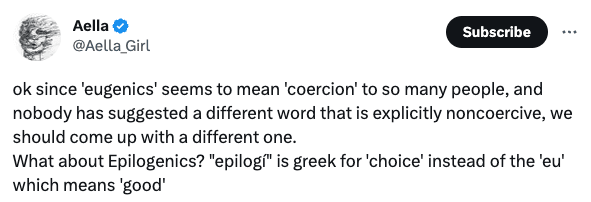I am conditionally in favor of human genetic augmentation. In particular, I think embryo selection for intelligence, health, happiness and other positive traits is desirable. When I bring this up with people, one of the most frequent questions is "Isn't that eugenics?"
I never know how to respond. The term "eugenics" has absorbed so much baggage over the last century that it somehow refers both to swiping right on Tinder when you see an attractive person and to the holocaust.
These are not similar concepts. The fact that we use a single word to refer to both is crazy. I cannot count the number of debates I've heard about human genetic engineering where the disagreement boils down to people misunderstanding what the other is advocating for. One person will talk about the benefits of improving the genes of future generations, and the other person will attack the idea because they mentally associate it with "eugenics", and to them that means "the holocaust" and "state sponsored sterilization of people with disabilities".
The fault lies with the term itself. It means so many different things to so many people that its use actively hinders understanding. For this reason, I think we should start using a new term to talk about non-coercive means of improving human genetics.
Epilogenics: non-coercive means of changing genetics
This term originated with Aella on Twitter, and I think it perfectly fits the purpose I have in mind.
Examples of epilogenics
- Selecting an embryo for lower disease risk, higher intelligence, or some other trait good for both the individual and society
- Gene editing for the purposes listed above
- Choosing an attractive spouse
Examples of things that are not epilogenics
- State-sponsored sterilization of people deemed “unfit”
- Rules against marriage of family members such a siblings and cousins
- Things people think of as eugenics even though they are often bad for genes (i.e. genocide)
I would encourage the use of this term to clarify the difference between genocide and screening one's embryos for desirable traits.









The most common anti-eugenics stance I encounter is also opposed to epilogenics. From this point of view, parents choosing to select for desirable traits in their offspring using advanced medical technology is wasteful, immoral and gross. They have roughly the same feelings about epilogenics (including for intelligence) as they have about cosmetic plastic surgery. To them, a natural and traditional trajectory of healthy human lifespan is ideal - we should maintain our health via diet and exercise, try not to care too much about superficial traits like appearance or intelligence, then die in our 80s or so.
I think that convincing doctors and patients that it’s good to take fuller control of one’s own body (and to influence their children’s bodies) via advanced med tech is the main hurdle to promoting an acceptance of epilogenics.